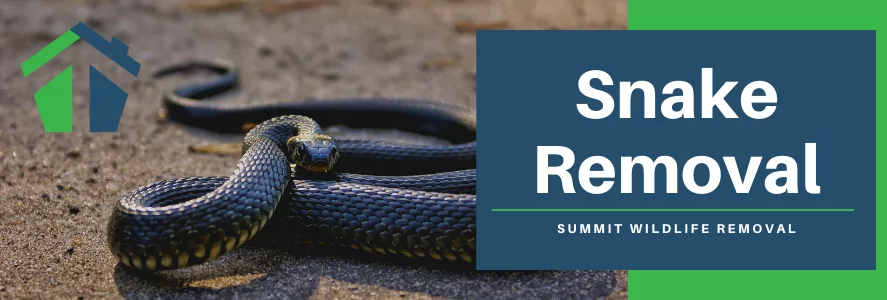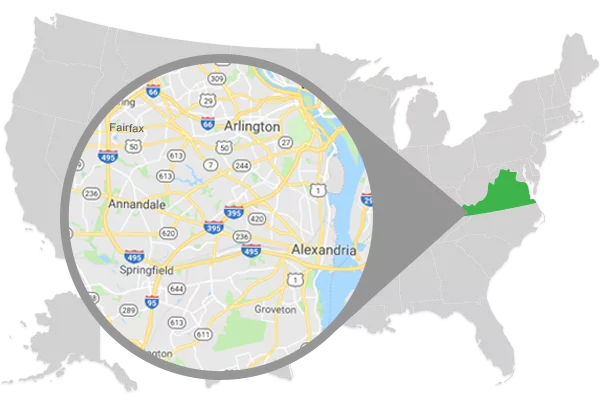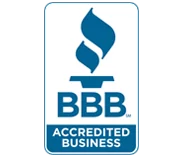Snake Removal in Fairfax, Alexandria and Arlington, VA
Do You Have a Snake Concern?
The primary complaints revolve around ophidiophobia, the fear of snakes, which many people have. All fears aside, These creatures can pose a potential danger; most people can’t tell the difference between a venomous and non-venomous reptile. It is best to be cautious around all snakes. They inhabit many ecological niches and often reside around man-made structures for warmth. They’ll get into pools, screened porches, and oftentimes, the home itself. Snakes don’t need much space to enter a home, which can make reptile exclusion installation essential.
How do we Get Rid of Snakes?
If you’ve got a snake on your property, you might just want to leave it alone. It’ll be on its way. Should you see a snake regularly, then you’ll want to have it removed. If you’ve got a snake inside your house and you are unsure of the species, don’t try to catch it . Most cases of snake bites occur when a person is trying to kill or catch a snake. The safest method of removal is to contact a qualified professional to take care of the snake problem. Our wildlife removal technicians are trained to humanely catch and remove troublesome snakes from homes and properties.
Why Should I Address the Problem?
Snakes can carry and spread a variety of diseases. There are roughly 40,000 reported snake bites per year, 8,000 of which are venomous. Snakes can get through the tiniest crevices and like to take up shelter in walls, where they can also die, which can be very difficult to remove. Furthermore, snakes feed on rodents and insects, usually where there are snakes, there are rodents and insects in droves. Finding snakeskin in your home is a telltale sign of a snake present in your home.
Schedule a FREE
Estimate
Fields with (*) are required.
Fields with (*) are required.
What are the Most Common Diseases Spread by Snakes?
Diseases that can be passed to humans include salmonellosis, botulism, leptospirosis, and campylobacteriosis. The toxic venom in the Virginia Copperhead is very caustic.
What can I do for Snake Control?
- Get your home inspected by a licensed wildlife specialist
- Seal entry points (be sure that all wildlife is gone)
- Get professional-grade repairs done
- Install screens
- Exclusion or snake control
Do Snakes Have Natural Predators?
According to the experts at National Geographic and our wildlife technicians, snakes have many enemies if you can believe it. Enemies like large birds, wild boars, a mongoose, raccoons, foxes, coyotes and even other snakes are a few of the dangers snakes fall prey to.
A lot of people find it surprising that even the largest and the scariest of snakes can be afraid. While they are young they are easy prey to many birds and mammals but when they are older and larger they have humans to fear.
Humans hunt snakes for various reasons. Many different breeds of snakes are captured and shipped to other countries to be sold in pet shops. Which also explains why the python epidemic in Florida is so big. Venomous snakes are used for making anti-venom, which is made from their venom and is used to save the life of a snakebite victim. Snakeskin is used for making many things including shoes, purses, and belts. And, unfortunately, many people often kill snakes out of fear.
One of the biggest threats to the snake population, the same as with many other animals, is the destruction of their habitats by humans. Their homes are being destroyed to make room for ranches, farms, and highways.
Snakes have many ways of protecting themselves. Their coloring alone is great camouflage and some snakes can burrow down under sand or leaves for extra coverage. Some huff, puff and hiss loudly or shake their rattle tail to scare off a possible predator while others will flop over and hang their tongue out and play dead. Venomous snakes will try to escape or frighten off a hunter before ever trying to bite them.
What is a Snake Survey?
We offer a Snake Survey to homes and businesses for a fee starting at $175. With the survey, we will send a Wildlife Expert to thoroughly inspect inside the dwelling, check for other species that will attract snakes, outside around the property and look for evidence of the presence of snakes and rodents. We look for rodents because they are a favorite meal for snakes and if you have rodents, more than likely you have snakes as well.
How Much does it Cost to Remove a Snake?
The fees associated with snake removal vary.
Contact your local Wildlife Removal Experts, Summit Wildlife Removal, for Snake Removal in Fairfax, Alexandria & Arlington, VA.
Contact us online or give us a call at 703-884-2124 when you need our services. For dog or cat issues, contact your local municipal animal control office.













